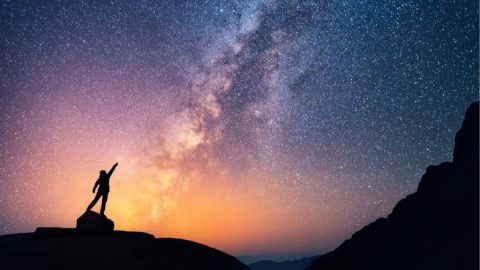Inexplicable

When we contemplate the existence of the universe, of all there is, two possibilities come immediately to mind: either the universe has existed forever, or it emerged sometime in the past.
“Forever” is a strange idea, difficult to comprehend. We can imagine forever, of course, but only as an abstraction. The notion of eternity clashes directly with our own sense of time, anchored as it is in chunks of finite duration: seconds, minutes, the 24 hours of a day, a year, a decade, a lifetime. We can push things further out to millennia, but start losing our grasp soon after.
We make statements like “our species has existed for about two hundred thousand years,” or, “the highest mountains have been here for tens of millions of years,” or, “dinosaurs went extinct 65 million years ago,” or “life originated on Earth some 3.5 billion years ago.” Such statements may get a nod of acceptance because we have developed trustworthy scientific dating methods to actually know these things.
But we can’t truly comprehend these kinds of long times in our minds with any sort of specificity. We have no capacity to experience what truly long times mean, the kinds of things that can happen when the clock ticks for millions of years. To most, contemplating continents drifting, mountains rising, or life forms changing across millions of years is very hard, if not impossible.
Although we know little of how people lived fifty thousand years ago, we do know that they were well aware of the passage of time. They died young, as victims of predators, intertribal violence, hunger, and disease. They looked at Nature with a mix of fear and awe, knowing that it provided food and shelter, but also that it could cause massive destruction and chaos. They were also well aware of natural cycles such as day and night, of the passage of the seasons, of the change and transformation observed all around them. There was thus a tension between the world that existed before their memories did, lost in the distant fog of time, and the ongoing changes they noted every day—the cycles of life and death, the parade of lights coming and going across the skies.
Shouldn’t the world itself somehow reflect these possibilities? If cycles kept on repeating in the world, the world itself could have been born and destroyed in endless cycles extending to the infinite past. Alternatively, the world could have existed forever, and the only changes were the cycles of life and death in the forests and the fields. In both cases—whether the world created and destroyed in endless cycles, or an eternal world that had existed forever—there is no special moment of creation, no explicit beginning of time itself. These kinds of creation myths tell stories of eternal worlds.
Another possibility
There is, however, another possibility: as a mirror to our own finite existence, the ancients must have considered a world that, like us, had an origin in a specific moment in the past, a world with a beginning. These kinds of creation myths tell stories of worlds that appeared at a specific time in the past. And they are, by far, the most common.
Just ask yourself the questions, “Why is there a universe? Why do I exist in it?” and you will quickly realize that these are very hard questions indeed. Why so hard? Because they force us to confront our physical limitations.
We humans think in terms of cause and effect: something happens because something else caused it. To score a goal, the ball must be kicked; to have a baby, female eggs must be inseminated, naturally or artificially; to fly from Boston to San Francisco, we need a machine capable of transporting us in the air; for a planet to orbit the sun, there must be a gravitational attraction between them. All very obvious.
But when it comes to the universe, things get tricky. If the universe, by definition, contains everything that exists, what could have caused it? If we say an external force, then the universe doesn’t contain everything that exists and must be enlarged to contain that force. But then you can ask, “And what caused the universe with that force?” You get stuck in an endless regression.
This is the problem of the First Cause: if we see the world as an endless succession of causes, there has to be the one—the very special one—that initiated it all. And since it’s the first, there couldn’t be another to cause it. So, the First Cause needs to be uncaused. It needs to just happen.
A divine cause?
In their own way, our ancestors realized this. To get around it, they postulated the existence of a deity that transcended such cause-and-effect limitations. To them, the First Cause had to be divine. Science, of course, operates in a very different context. Still, the point is that we can’t escape the problem of the First Cause; we can’t give it a rational, self-contained explanation without invoking an outside element.
Modern scientific theories of the universe fare no better. They need a whole framework involving laws of nature and concepts of space, time, energy, and fields, as a scaffolding to their formulation. Postulating those as a starting point is the scientific way to get around the problem of the First Cause. We can’t think outside the box when the box is all there is.
What can be done then? We must accept that there are certain questions that will remain beyond our rational grasp. Acceptance doesn’t mean surrender. It simply means that we are aware of the limitations of our rational approach and have the humility to understand that, despite our achievements.
Science remains the best way to make quantitative sense of the natural world. This should be incontestable. To accept that science has limits simply means that we can understand Nature only imperfectly. This understanding is extremely efficient when it comes to questions within scientific reach, such as planetary orbits, the role of antibiotics, or global warming. But it reaches a hard wall when it faces the First Cause.
The post Inexplicable appeared first on ORBITER.





